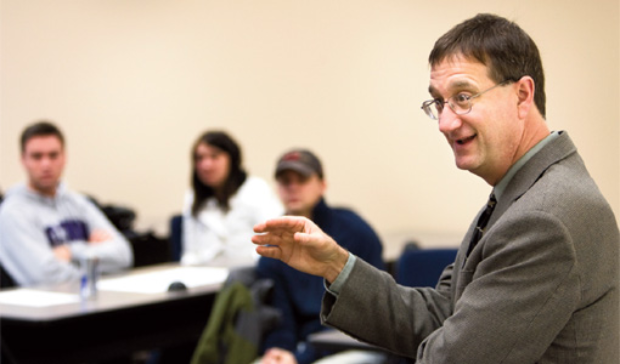Professor Brian Shapiro of St. Thomas’ Accounting Department, a member of the Jewish faith, has been involved with the Center for Catholic Studies’ programs for several years. Perspectives interviewed him about his participation in the center’s activities and about his team-taught “bridge” course: Christian Faith and the Management Professions: Accounting.
Tell us about your professional background and how you became involved with the Center for Catholic Studies.
Before I joined the St. Thomas faculty in January 2004, I had spent nearly 20 years as an accounting graduate student and faculty member at the University of Arizona and the University of Minnesota. I was initially trained to do research in behavioral decision-making and experimental psychology, and I later branched out into experimental economics. But my primary research interests involve questions that draw on philosophy, social theory and policy. My research now explores accounting’s broader roles in organizations and society, how accounting outcomes both shape and are shaped by the social institutions in which they are embedded, and how culture and religion influence accounting and other business practices. My research on these topics has enriched my teaching and service at UST, and it fits nicely with UST’s faith-based mission.
I owe much to the Center for Catholic Studies for the opportunities it has given me to explore with my colleagues how we can relate the Catholic intellectual and social traditions to our professional, civic, family and spiritual lives. I first became involved with the Center for Catholic Studies during a weeklong seminar in June 2004 led by University of Notre Dame philosophy professor David Solomon. We discussed Walter Miller, Jr.’s A Canticle for Leibowitz and its relation to narrative raditions, morality and ethics in Alasdair MacIntyre’s After Virtue: A Study in Moral Theory. The following summer I participated in the Catholic Studies seminar on Catholicism and Contemporary Culture led by Thomas Hibbs, dean of liberal arts at Baylor University. In June 2006 and again in 2007 I participated in the Catholic Intellectual Tradition faculty seminars at the Daniel C. Gainey Conference Center in Owatonna.
How has your participation in these center seminars influenced your teaching?
These faculty development opportunities have helped Michael Naughton andme to prepare and deliver a theology and Catholic Studies “bridge” course for accounting majors, titled Christian Faith and Accounting. In the course we discuss Catholic, Protestant and Jewish theological and philosophical texts to understand Judeo-Christian perspectives on work and leisure, and we examine the basis for a faith-filled response to the vocation of accountancy. As with other UST senior capstone coursesdesigned to bridge faith and the students’ chosen fields, this course was inspired by Pope John Paul II’s encyclical Ex Corde Ecclesiae. In particular, the themes in this encyclical that speakost directly to my Jewish faith are the respect and dignity it expresses toward all faiths and disciplines and its vocational emphasis on our partnership with God when we use our talents and abilities to improve the world and ourselves.
Please elaborate on the relationship between the Christian faith and theaccounting profession.
The relation between theology and accounting can be illustrated by the two creation stories in Genesis. In Genesis 1, Adam and Eve are commanded tosubdue the earth. This obligates us to use science and technology, including accounting, to advance the dignity and freedom of all persons in a manner that fits the majesty of our having been created in the image of God. While the same social justice commitments also can be derived from secular humanism, the inferences we can draw from the creation story in Genesis 2 are uniquely theological. In that story, Adam is created by receiving the breath of life from God – divine inspiration. This secondversion of Adam’s creation leads him to seek a redeemed existence by controllinghimself rather than by controlling nature. He is interested in metaphysical and philosophical inquiries to understand his place and role in a universe willed and approved by God. In addition, in this account Adam is created alone and has to sacrifice part of himself in order to have a companion. These experiences enrich and deepenAdam’s relationship with Eve and with God, and are central to his spirituality.
Both Adams were willed by God and represent types of Universal Man or Universal Woman that exist within us. Accordingly, we encourage our accounting students to concern themselves with the vocations of both types. A difficult question we ask our students is, how does cultivating the faith experience of the second Adam or of Eve improve either accounting practice or ourselves as accounting practitioners? We maynever find a complete or final answer to this question. But I believe that the answer must somehow involve two related themes that figure prominently in our faith-based university. First, it is important for us to engage in some activities, such as the celebration of God and observance of the Sabbath, for their own sakes, without concern for their practical or utilitarian consequences. This can counteract capitalism’s tendency to denigrate and devalue whatever does not have an immediate impact on profit. Second, when we place a higher priority on people over profit and things, we truly support the development of whole persons, including their spiritualities.
For many of us in the St. Thomas community, a complete and authentic life includes a central role for spirituality, prayer and faith. My participation in this community has enriched my professional activities at UST, my faith and my conversations with people from other faith traditions.







